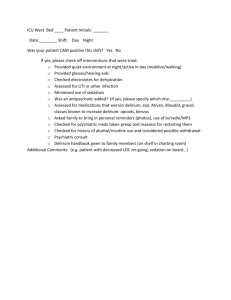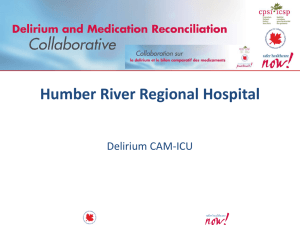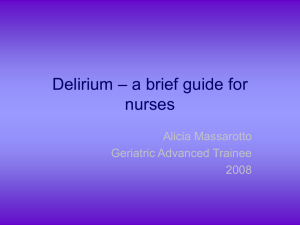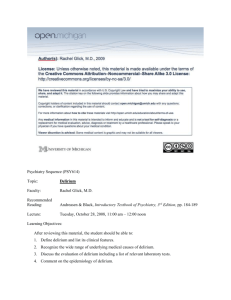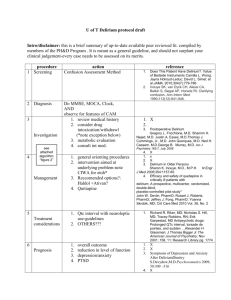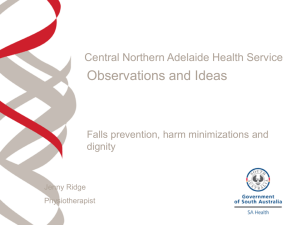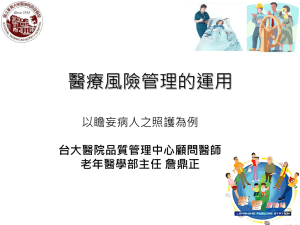Delirium care bundle - British Association of Critical Care Nurses
advertisement
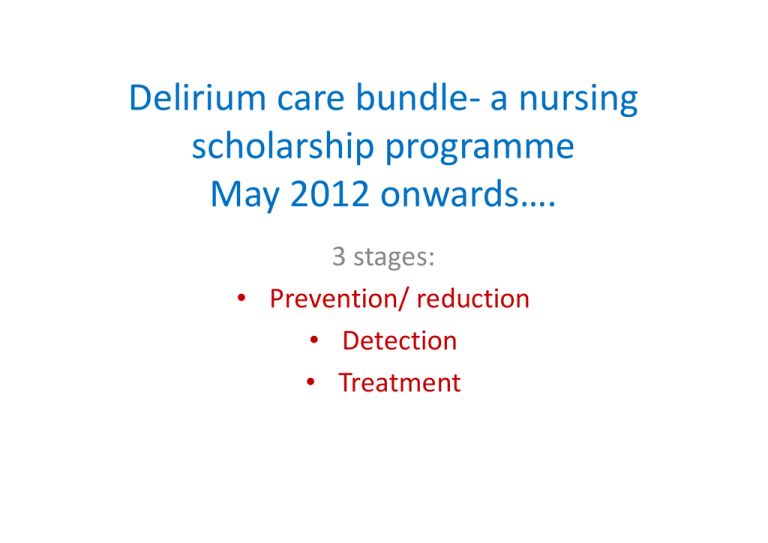
Delirium care bundle- a nursing scholarship programme May 2012 onwards…. 3 stages: • Prevention/ reduction • Detection • Treatment Delirium is a symptom of an organ failure- brain failure! 3 types • Manic/ agitated delirium- very easy to detect- most frequent presentation currently- CAMICU undertaken reactively often. • Mixed- hyper and hypoactive- often detect hyperactive but miss the hypoactive stages and consider delirium resolved for a short period of time • Withdrawn- can only detect this by undertaking a full CAMICU and looking for disorganised thinking and inability to follow commands. (evidence- worse than others 2 types= 45% percent 6 month survival vs 55-60%) Delirium causes • Hypothesis 2012: apart from elective admissions often insult causing delirium cannot be prevented or treated. In elective admissions we may be able to prevent delirium causing insult, through prevention/ reduction care bundle. We cannot do anything about this? Or can we? Why worry about delirium- it is just a consequence of ICU in-patient stay right????? • Delirium affects between 48% and 60% of all adult ICU/HDU inpatients(ICS 2006) • Increased LOS (often for duration of delirium 4.2 days on average +/- 1.7 days) • Increased costs of treatment associated with inpatient stay • Poor utilisation of scarce level 3/ level 2 resource (NHS ICU /HDU beds) • Increased mortality (+20% on average for all types of delirium at 6 months) • Poor 1 year cognitive function for survivors • Increased costs long-term of delirium survivors- similar to Alzheimer's/ dementia patients • NHS efficiency plans- £20 billion over next 5 years just to match current service provision- are you up to that? https://www.gov.uk/government/policies/making-the-nhsmore-efficient-and-less-bureaucratic Delirium associated with increased risk of death- Ely et al. JAMA, 2004 Kaplan-Meier Curve for ICU Patients The prevention/ reduction care bundle Targets ICU environmental issues/ Multi-modal 5 components • Noise levels/ sleep deprivation- lights, sound ear, ear plugs • Music therapy (MT)- ipods purchased to be used on all mechanically ventilated +/sedated patients + any other awake patient who wants music to be played- good evidence for reduction of stress, pain, anxiety and thus delirium. Music to be played as much as possible during the daytime. Remove MT for interventions e.g. turning, eye care, mouth care. Remove music therapy at night?? and put in place ear plugs. • Reorientation therapy- 2-3 hrly (even if sedated) who, where, when, why, what • Screen for delirium/ camicu on every shift (alongside falls risk assessment, both very much interlinked/ associated) • Early mobilisation- physical activity and getting out of bed encourages early rehab, promotes day/ night cycle, contributes towards reorientation therapy as able to see where they are. Tires patient out and promotes natural sleep. The wider issues- dealt with elsewhere• IHI care bundle- no more than 5 elements! • Pain control- VAS/Abbey scoring- aim -2/-3 • Treat constipation • Prevent dehydration The music playlist- music times- daytime when no interventions being delivered, night time- volume selection 9 or 10- staff check- “music barrier to environmental noise” • Bach- Goldberg variations • Debussy- premiere arabegque • Jeansibelius- “valse Triste” orchestra • Vivaldi- “winter” largo and the four seasons 2 • Bach- orchestra 1 and orchestral suite no 3 • Piano- Choplin nocturnes 1,2,8,10,14,19,21 (several parts of this are really good) • Liszet – leibstraum 1,2+3 Detection care bundle • CAMICU scoring once per shift and with any change in cognitive function/ mental status • BM/ ABG and review of blood results with any sudden change or +ve CAMICU score- send more bloods to assess cause of onset of delirium • Medication review- have we given any agent/ drugs/ combination of drugs- known pharmacology, that could cause acute change to cognitive status- use of medication to control delirium• “benzo’s are bad” (AACCN 2012 + DECCA 2010), haloperidol is ok as a bolus, clonidine infusions (cheap) dexdor (not cheap) but effective • Pain control- pain score (VAS) needs to be 0-+2 max so pain controlled at rest pain score 0-+3 for at movement Abbey score needs to be 0-+3 at rest or at movement- strong correspondence between chronic undertreated pain and delirium Treatment care bundle • Continue all prevention/ reduction care bundle • Consider use of physical restraints as per protocol • Mobilisation/ physical exercise asap to promote rehab/ day night cycles, reorientation • Camicu scoring every shift +/- changes to cognitive function to track fluctuating nature of delirium and duration (Average duration 4.2 days +/- 1.7 days.) Avoid use of benzodiazepines as associated with increased duration of delirium and higher mortality “benzo’s are bad” (DECCA 2010) Care bundle roll out • PDA cycles with delirium project group to ensure components evidence based (x3 cycles) • Innovian/ careview changes to be made to assessment page to encourage screening and compliance with care bundle. • Delirium care bundle roll out date 1st May 2013 • Safety brief to highlight those patients camicu +ve and falls risk +ve (associated risks) • White wipe boards to highlight these patients so all staff aware • Education, education, education to care bundle Our results!- most recent data May 2014May 2015 in red Our results • • • • • • • • • Pre-delirium care bundle <May 2013, CAMICU done infrequently on an adhoc basis almost to prove a patient was delirious when behaving delirious- 140 patients in 18 months- March 2012-September 2013- broken down as 54 in 2012 and 98 in 2013 Roll out of care bundle May 2013- 2014- 268 patients cam icu +ve scored – much bigger issue than anticipated- prevalent in 1:4.7- with a much higher percentage of positive cases in certain subsets- although national prevalence data ICS 2009- 48%-60% of all adult ICU inpatients Now seeing reductions 2015- 11.72% of all admissions- 159 patients year to date May 2014 to May 2015 (environment/ lighting/ noise/ prescribing practices)“you need to know your enemy!”Highest incidence =Emergency admissions with alcohol dependency as a PMH The duration of MT was between 2 and 8 days for all 115 patients that received MT at level 3 dependency and 56 at level 2 2014 data Duration of delirium for 268 patients reduced from duration range of 1-14 days to 1-6 days in 2014 to a maximum of 5.5 days in 1 episode 2015, so a significant reduction in documented duration of delirium total and mean duration. This data is very strong indicator for a care bundle approach being highly effective in reduction of duration which has significant impact on availability of icu level beds and nursing workload within icu and ward areas. Since May 2013- circa 2000 ICU bed days saved through reduction in delirium on our unit alone- helping us to match increased demands on our service. Circa £3million efficiency saving in 2 years- (based on 1 bed day= £1500)- this is not appreciated by UHB- no resource to target delirium- all being done in our own time/ adhoc. Delirium risk factors/ case note review 2014 dataset OR ANOTHER IDEA! THANK GOD FOR CIS- NORAD CONTINOUS DOSES VS CAMICU+VE NOW!! (May 2014-May 2015 data)= 159 patients CAMICU +ve NORADRENALINE IS A NEUROTRANSMITTER!!! The bad • Music therapy applied to 115 patients at level 3 and 56 level 2 patients- not as widespread as we hoped for- issues related to personal preferences and judgements- 2014 data • Less MT YTD in 2015- 49 patientsproblems retaining equipment (lost/stolen ipods, chargers and headphones) • Headphones now ordered on eros- Thank you Vanessa Davies ICU Matron• Delay getting HEADPHONES through procurement!!!- now resolved • However 42 patients in 20132014 that were considered highrisk for delirium did receive MT prophylactically alongside care bundle and then did not develop delirium despite being in a subset of patients where this would be expected- this equates to a 35% successful prophylaxis rate when MT incorporated alongside a wider care bundle. • Staff compliance/ opinions- classical music (“classical music not my cup of tea”) Our care bundle compliance Care bundle vs no bundle- drugs! Struck gold Continuous medication regimen Delirium care bundle fully applied- 171 cases Incomplete care bundle1085 cases Delirium care bundle fully applied 2015- 49 patients Incomplete care bundle- 1307 Propofol (mean mg/hr) 110 150 125 160 Alfentanil (mean mcg/hr) 1000 1700 1100 1650 Remifentanil mcg/kg/min 0.15-0.2 0.2-0.25 0.1-0.15 0.3-0.4 Haloperidol boluses Mean total mg’s delivered 0.1mg 0.5mg 0.3mg 0.6mg Here comes something special……… THE FIRST IN THE WORLDUNIVERSAL TREATMENT ALGORITHM/ FLOWCHART….. What we have learnt- Future work • • • • • • • • • • • Unique in developing care bundle involving MT Successful reduction of duration of delirium and much better detection Care bundle and MT combined prophylaxis successful in 42 high-risk patients in 2014- 12 YTD in 2015 without incidence of delirium in these patients thus far. Delirium huge issue- 1:4 (25%) patients rather than 1:7/ 1:8 (15-17%) initially anticipated Now reducing to 11.72% YTD 2015 NaNonal awareness ↑- implications for critical care bed resources On just our unit circa 2000 level 3/2 bed days saved in 2 years due to in delirium More MT/ care bundle work- now issues with equipment resolving Can MT/ delirium care bundle help to reduce pain, anxiety and sedative requirements- initial data would indicate yes?- savings on pharmaceuticals- about to be costed!!!- could be £5-10K per annum Cognitive impairment assessment, delirium prevention care bundle, MOCA pre-discharge, follow-up of just delirium patients The concept of an “ICU EXTENDED WARRANTY” See what we can prove in just 1 more year… (exciting times)- link into ICNARC, ICS, CCN, AHSN try to pull this together nationally. Make our trust aware of huge potential ongoing efficiency savings we are making with zero additional resource or time. Costs of ICU related delirium to society- long-term survivors costs • Circa 70,560 adult icu/hdu patients per year survive to discharge who have had delirium (collated from multiple reference sources) (48% low margin of the 147,000 adult critical care inpatients per year UK-wide admitted- ICS 2006 data set- see Borthwick et al 2006). • Patient cognitive functionality variable and never universally followed-up. • Rough estimate is social care costs similar to treating long-term cognitive impairment/ dementia so £32,500 per patient per annum especially those delirious for 3 or more days or more than 1 episode or withdrawn delirium. • If we reduce Critical care delirium down to circa 12% similar to the BRI rates nationally then circa 62,000 patients a year will not be affected by delirium. • 62,000x £32.5K= £2.015 billion per year= critical care’s contribution to NHS efficiency savings over next 5 years…. done!!!(Alzheimer's Society and Kings Fund 2012) We need stronger evidence-based research on follow-up and survivors cognitive function- ICNARC, AHSN and CCN uniquely placed to work collaboratively in this area. Meanwhile over the pond… (USA) this might make you feel a little less despondent and better • AACCN 2012 data% of ICU patients, and it is estimated that IC: “Delirium affects up to 80% of inpatients and costs associated with delirium equal between $4billion and $16 billion annually in the US.” • We need to wake up to delirium and tackle this issue world-wide…. • I will phone Ban Ki-moon after this presentation… Do you offer an extended warranty to your patients? Or do you do this? Time to discharge your patient!!!! We are not alone……… Anaesthesia 2014- volume 69- p540-549 Original Article The effect of a multicomponent multidisciplinary bundle of interventions on sleep and delirium in medical and surgical intensive care patients* J. Patel,1 J. Baldwin,2 P. Bunting3 and S. Laha3 1 Medical Student, University of Manchester, Manchester, UK 2 Research Nurse, Critical Care Unit, 3 Consultant, Department of Anaesthesia and Critical Care Medicine, Royal Preston Hospital, Lancashire Teaching Hospitals NHS Trust, Preston, UK Acknowledgements • • • • Dr Kieron Rooney- ICU Consultant BRI Dr Sanjoy Shah- ICU Consultant BRI SSN Louise Sherratt- RN ICU BRI The MDT team – especially the nurses on ICUBRI- the results are ours as a team • Dr Dane Raynment- Clinical Psychiatrist, Psych Liaison Team • Thank you “above and beyond” for nursing scholarship 2013 REFERENCES • AACCN (2012) Delirium Assessment and Management, Scope and Impact of the problem Found at: http://www.aacn.org/wd/practice/content/practicealerts/delirium-practice-alert.pcms?menu=practice • Alzheimers society (2014) found at: http://www.alzheimers.org.uk/site/scripts/documents_info.php?documentID=418 • Dimitri Gusmao-Flores, Jorge Ibrain Figueira Salluh, Ricardo Ávila Chalhub and Lucas C Quarantini (2012)The confusion assessment method for the intensive care unit (CAM-ICU) and intensive care delirium screening checklist (ICDSC) for the diagnosis of delirium: a systematic review and meta-analysis of clinical studies. Critical Care 2012, 16:R115 also found at: • Ely et al 2002, CAMICU flowsheet found at: www.icudelirium.org/docs/CAM_ICU_worksheet.pdf • Luye S, Bernard G, Gordon S, Francis J, May L et al,(2001) Delirium in mechanically ventilated patients: Validity and reliability of the Confusion Assessment Method for the Intensive Care Unit (CAM ICU);JAMA; 2001; 286(21); 27032710. • Eugenia Cronin, Mick Nielsen, Martin Spollen and Nigel Edwards (2007) Adult Critical Care found at: www.birmingham.ac.uk/Documents/college.../01HCNASeries3D2.pdf http://ccforum.com/content/16/4/R115 • Griffiths JA, Barber VS, Cuthbertson BH, Young JD (2006)A national survey of intensive care follow-up clinics. Anaesthesia 2006;61(10):950–955 • Guenther U1, Popp J, Koecher L, Muders T, Wrigge H, Ely EW, Putensen C.J (2010) Validity and reliability of the CAM-ICU Flowsheet to diagnose delirium in surgical ICU patients. Journal of Critical Care. 2010 Mar;25(1):144-51. • Intensive Care Society (ICS) 2006- found at Borthwick M, Bourne R, Craig M, Egan A & Oxley J, Detection, prevention and treatment of delirium in critically ill patients; 2006; UKCPA. • The Kings Fund (2008) Paying the Price of Mental Health Care Found at http://www.kingsfund.org.uk/publications/paying-price • Page V, Navarange S, Gama S &McAuley D,(2008) Routine delirium monitoring in a UK critical care unit; Critical Care; 2008; 13(1); R16.
